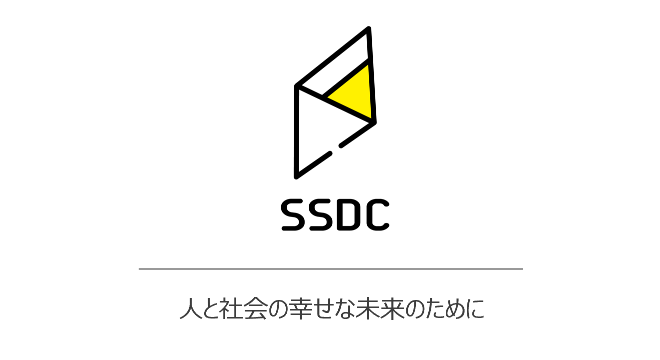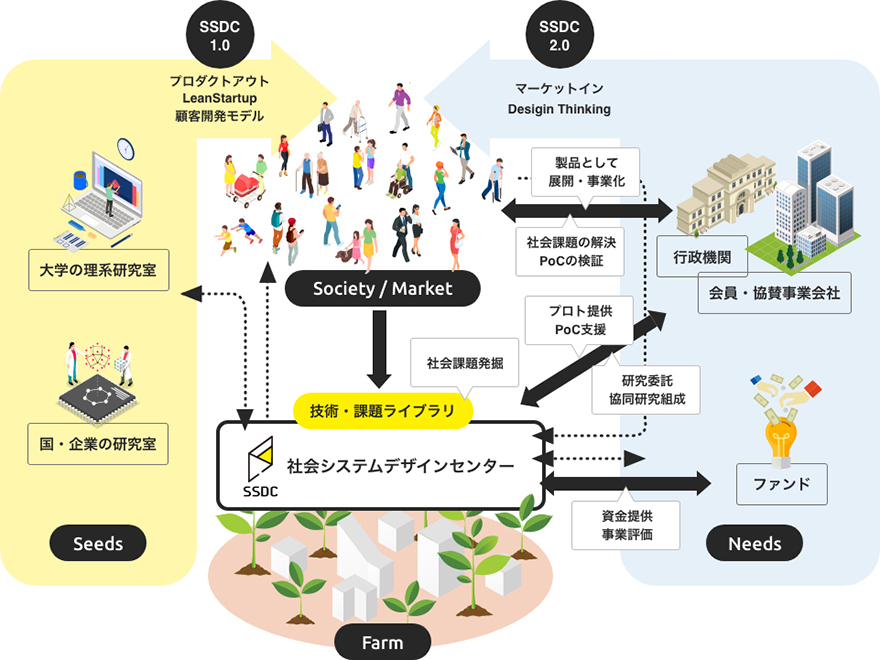JBS Establishes the Social Systems Design Center in Collaboration with University Research Institutions and Global Companies Aiming to Upgrade Society Centered On Needs-Based Enterprise Creation and Business Incubation
2019.09.02
AnnouncementJapan Business Systems, Inc. (Head Office: Minato-ku, Tokyo; Representative: Yukihiro Makita, President; hereinafter “JBS”) established a general incorporated association, Social Systems Design Center (hereinafter “SSDC”), for which JBS will be the main sponsor, on September 2, 2019. SSDC came into being centered on member companies—mainly global consulting firms and IT companies—and scientists and research institutions in the fields of AI, IoT, and robotics. With this powerful team, SSDC will harness its members’ knowledge and technological capabilities to take on the new challenge of creating services and businesses that contribute to upgrading society. SSDC aims to turn this challenge into activities that contribute to the development of a better society as well as nurture the seeds of entrepreneurship in Japan.

Background to Establishment
Under a “Customer First” corporate philosophy, JBS has been providing IT solutions from a client-oriented perspective since its establishment in 1990. In recent years, JBS has been more deeply involved in client issues, aiming to contribute to the business expansion of client companies as a digital transformation partner. In such circumstances, JBS formed SSDC (= SSDC 1.0) as an internal organization in 2015 aiming to “contribute to society through IT.”
Four years since then, we thought that if JBS could utilize IT technology to respond to all of our clients’ demands, perhaps we could further harness the knowledge we have accumulated up to now to resolve the global issues in general. To this end, JBS decided to contribute to upgrading society by cooperating with leading researchers in Japan thinking on the same wavelength and enhancing business-academia collaboration through partnerships with world-renowned IT companies and consulting firms, leading to the establishment of the general incorporated association Social Systems Design Center (=SSDC 2.0). Harnessing our experience up to now, JBS will introduce a cooperative structure with member companies, students, and scientists and use not only product-oriented methods, but also business creation processes based on market-oriented ideas to create new products and solve problems.
Characteristics of the Social Systems Design Center
We aim to create business not only from technology seeds, but by coming up with ideas stemming from social issues and corporate, organizational, and individual needs and matching them with Japanese technologies.

The Five Businesses that Social Systems Design Center Plans to Handle
- Problem-solving solutions business
We will undertake problem detection and client identification for business creation through to prototyping and model verification using a framework based on design thinking*1, JTBD*2, lean startup*3, etc. - Joint research support business
We will match the needs of research labs and those of society to create new business. We will listen to demands from companies, introduce them to suitable research labs, and consider creating businesses. - Incubation business
We will fund newly created businesses and scout students, entrepreneurs, in-house start-ups, and establish new companies. - Personnel development and seminar business
In order to foster personnel who can envisage the future and create value, we will hold seminars on AI and IoT, frameworks, research theme explanations, and social problem-solving methods. - Open hub business
We will provide a space for networking through discussions with leaders in their respective fields who have the seeds and needs that will lead to solving social problems.
Note
- 1. Design thinking
Design thinking is a problem-solving process proposed by American design consulting company IDEO. It is a framework for solving problems from users’ perspectives. It refers not only to design in the broad sense such as graphics and web design, but to clarifying problems and issues in society and drawing out solutions. In recent years, it has been adopted as an approach for problem-solving in business management, marketing, etc., at renowned companies worldwide. - 2. JTBD
Job-To-Be-Done, job theory. This is an effective method of logically grasping customers’ needs when developing products and services. It has been proposed recently by Professor Clayton Christensen of Harvard Business School who is famous for the book The Innovator’s Dilemma. - 3. Lean startup
Lean startup is a management method for launching startups and new businesses proposed by American entrepreneur Eric Ries in his 2008 book The Lean Startup. It is a methodology for starting business with no waste and efficiently (=lean)
 Share
Share